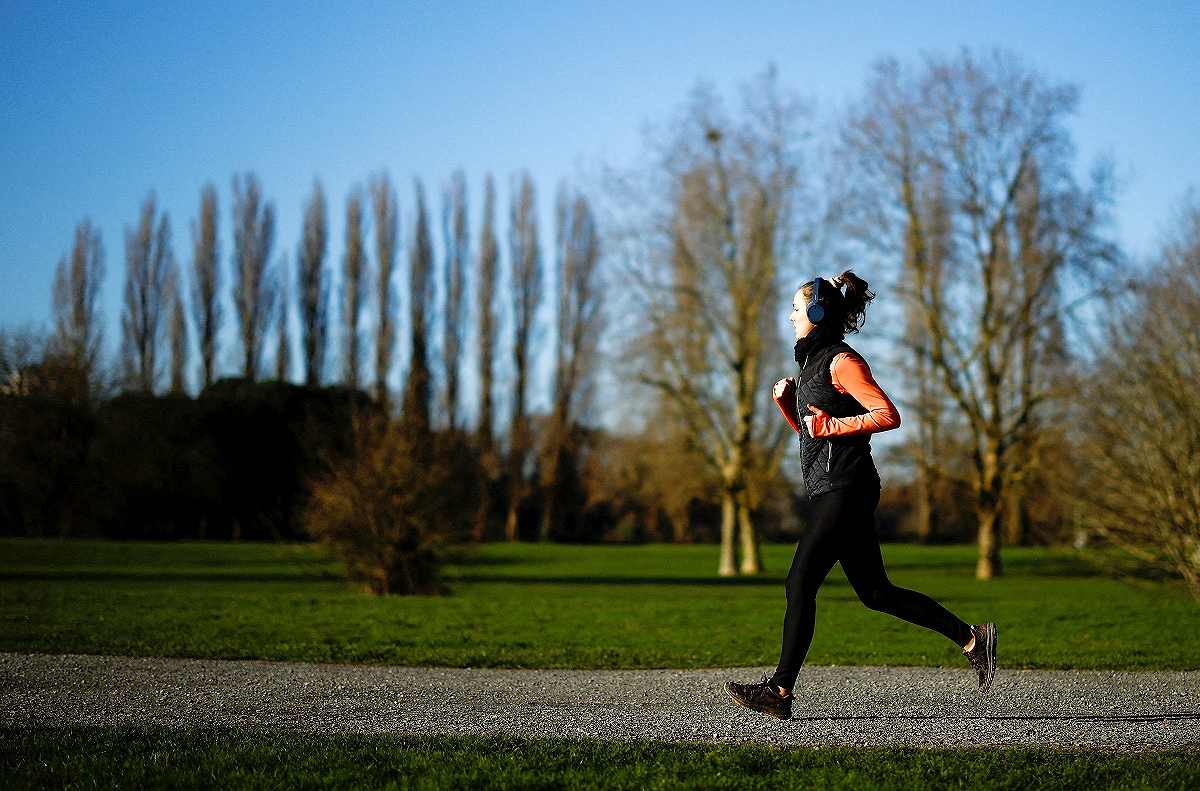
A woman jogs in a park in Saint-Sebastien-sur-Loire near Nantes, France, in January.
12:51 JST, September 19, 2024
Women’s heart disease risks and their need to start taking preventive medications should be evaluated when they are in their 30s rather than well after menopause as is now the practice, said researchers who published a study last month.
Presenting the findings at the European Society of Cardiology annual meeting in London, they said the study showed for the first time that simple blood tests make it possible to estimate a woman’s risk of cardiovascular disease over the next three decades.
“This is good for patients first and foremost, but it is also important information for [manufacturers of] cholesterol-lowering drugs, anti-inflammatory drugs and lipoprotein(a)-lowering drugs — the implications for therapy are broad,” said study leader Dr. Paul Ridker of Brigham and Women’s Hospital in Boston.
Current guidelines “suggest to physicians that women should generally not be considered for preventive therapies until their 60s and 70s. These new data … clearly demonstrate that our guidelines need to change,” Ridker said. “We must move beyond discussions of 5 or 10 year risk.”
The 27,939 participants in the long-term Women’s Health Initiative study had blood tests between 1992 and 1995 for low density lipoprotein cholesterol (LDL-C or “bad cholesterol”), which are already a part of routine care.
They also had tests for high-sensitivity C-reactive protein (hsCRP) — a marker of blood vessel inflammation — and lipoprotein(a), a genetically determined type of fat.
Compared to risks in women with the lowest levels of each marker, risks for major cardiovascular events like heart attacks or strokes over the next 30 years were 36% higher in women with the highest levels of LDL-C, 70% higher in women with the highest levels of hsCRP, and 33% higher in those with the highest levels of lipoprotein(a).
Women in whom all three markers were in the highest range were 2.6 times more likely to have a major cardiovascular event and 3.7 times more likely to have a stroke over the next three decades, according to a report of the study in The New England Journal of Medicine published to coincide with the presentation at the meeting.
“The three biomarkers are fully independent of each other and tell us about different biologic issues each individual woman faces,” Ridker said.
“The therapies we might use in response to an elevation in each biomarker are markedly different, and physicians can now specifically target the individual person’s biologic problem.”
While drugs that lower LDL-C and hsCRP are widely available — including statins and certain pills for high blood pressure and heart failure — drugs that reduce lipoprotein(a) levels are still in development by companies, including Novartis, Amgen, Eli Lilly and London-based Silence Therapeutics.
In some cases, lifestyle changes such as exercising and quitting smoking can be helpful.
Most of the women in the study were white Americans, but the findings would likely “have even greater impact among Black and Hispanic women for whom there is even a higher prevalence of undetected and untreated inflammation,” Ridker said.
“This is a global problem,” he added. “We need universal screening for hsCRP … and for lipoprotein(a), just as we already have universal screening for cholesterol.”
Top Articles in Science & Nature
-

Japan Institute to Use Domestic Commercial Optical Lattice Clock to Set Japan Standard Time
-

Japan to Face Shortfall of 3.39 Million Workers in AI, Robotics in 2040; Clerical Workers Seen to Be in Surplus
-

Record 700 Startups to Gather at SusHi Tech Tokyo in April; Event Will Center on Themes Like Artificial Intelligence and Robotics
-

iPS Treatments Pass Key Milestone, but Broader Applications Far from Guaranteed
-

iPS Cell Products for Parkinson’s, Heart Disease OK’d for Commercialization by Japan Health Ministry Panel
JN ACCESS RANKING
-

Japan PM Takaichi’s Cabinet Resigns en Masse
-

Japan Institute to Use Domestic Commercial Optical Lattice Clock to Set Japan Standard Time
-

Israeli Ambassador to Japan Speaks about Japan’s Role in the Reconstruction of Gaza
-

Man Infected with Measles Reportedly Dined at Restaurant in Tokyo Station
-

Videos Plagiarized, Reposted with False Subtitles Claiming ‘Ryukyu Belongs to China’; Anti-China False Information Also Posted in Japan























